July 12, 2018
Edited by David Sanders
Specimen Days
1868—Stefan George, German lyric poet (Algabal), is born.
1876—Max Jacob, French poet (d. 1944), is born.
1879—Han Yong-woon, Korean Buddhist reformer and poet, born in Yucheon, Hongseong, South Korea (d. 1944), is born.
1900—Fjodor Godunov-Tcherdynchev, Russian poet (Life of Tchernyshevsky), is born.
1904—Pablo Neruda, Chilean poet (Residence on Earth-Nobel 1971), born in Parral, Chile (d. 1973), is born.
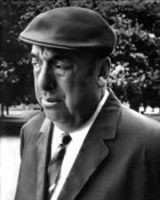
There are cemeteries that are lonely,
graves full of bones that do not make a sound,
the heart moving through a tunnel,
in it darkness, darkness, darkness,
like a shipwreck we die going into ourselves,
as though we were drowning inside our hearts,
as though we lived falling out of the skin into the soul.
—from “Nothing But Death” by Pablo Neruda, translated by Robert Bly
“There are cemeteries that are lonely, / graves full of bones that do not make a sound,” – Pablo Neruda
World Poetry
Poet Robert Minhinnick wins Wales Book of the Year

Robert Minhinnick, who grew up near Bridgend and studied in Aberystwyth and Cardiff, also won the Roland Mathias Poetry Prize. His book, a collection of poems called Diary of the Last Man, was described as "environmentalism turned into elegy”. Minhinnick accepted the award and a £4,000 prize at a ceremony run by Literature Wales in Cardiff on Tuesday.
Modernist Vanguard Poet Rogelio G. Mangahas; 79
The literature and arts community woke up on July 4 with a heartbreaking news—poet, essayist, editor, teacher and translator Rogelio G. Mangahas is dead. Known to his friends as Roger, he bade us farewell at the University of Santo Tomas Hospital two days after suffering from a massive stroke.
Robert Minhinnick, who grew up near Bridgend and studied in Aberystwyth and Cardiff, also won the Roland Mathias Poetry Prize.
Recent Reviews
Second Acts: A Second Look at Second Books of Poetry by Charles Simic and Jacob Shores-Argüello
by Lisa Russ Spaar
It is impossible to talk about the first two poetry collections by poet, translator, and essayist Charles Simic, who turned 80 this May, without also briefly mentioning George Hitchcock, California publisher and editor of the intrepid literary magazine Kayak (1964–1984) and the Kayak Press, which brought out What the Grass Says (1967) and Somewhere Among Us a Stone Is Taking Notes (1969), as well as second books by Philip Levine, Raymond Carver, and a host of other poets who were still under the radar.
Sex, Death, Suffering and Surrealism, in New Books of Poetry
by Daisy Fried
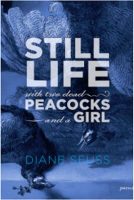
Death, class, gender and art are among the entwined preoccupations in this marvelous, complex, attractive, frightening book, which allows life to spill out of the frames of the artworks providing occasions for the poems. Ekphrasis (art about art) in Seuss’ wonderfully flexible syntax, with her linguistic pizazz and startling juxtapositions, removes boundaries between living and dying, paradise and hell, made things and lived things.
Death, class, gender and art are among the entwined preoccupations in Still Life With Two Dead Peacocks and a Girl by Diane Seuss.
Broadsides
Wounded Elders: On Racial Identity and Reviewing
What a review of Ocean Vuong’s Night Sky with Exit Wounds tells us about critics’ narrow perceptions of immigrant and war-affected identities
by Paisley Rekdal
In the June 2018 edition of The New Criterion I came across an omnibus poetry review titled “Old Wounds” in which the critic and poet William Logan wrote this of Ocean Vuong’s first book of poems, Night Sky with Exit Wounds:
Little in Vuong’s work conveys the immigrant’s wrenching dislocation or permanent sense of loss, the rupture of identity between two worlds and the knowledge of being orphaned in both. Whatever private terrors lie within the poems, we get only the PG version, with X-rated snippets here and there. The poet was eleven before he learned to read, but this has more standing in his publicity than in poetry. The emotion that seethes beneath, a rage more unnerving for largely being repressed, is far more articulate than anything he brings himself to admit.
What Makes Poetry Worth Reading?
A new wave of Canadian poets are giving us poems as complex and varied as the country itself
by Richard Sanger
At some point, most poets in Canada give up on Canadian poetry. Some go abroad to pursue their careers in bigger ponds; others simply send their poems abroad. For many others, going “abroad” means embracing some new art or activity that will bring them greater reward and perhaps renown. The novel is the usual next port of call, though the list of other odysseys Canadian poets have embarked on is long and curious: music, religion, carpentry, bartending, film, and (my favourite) protistology. Part of this is financial. But there is also a social side, a general assumption that poetry is something you secrete in puberty or when you’re hurt. The idea that you would actually continue to devote yourself to such an art is seen as proof of your self-delusion, if not terminal narcissism.
Poet of the People
The partisan world of Pablo Neruda
by Benjamin Kunel
The poet Pablo Neruda was born in 1920 at the age of 16. It was in October of that year, anyway, that a young man whose unsuspecting parents had baptized him Ricardo Eliecer Neftalí Reyes Basoalto first signed with the name Neruda the poems that he felt he existed in order to write. Already, at 15, Neftalí (as his familiars addressed him until he escaped to college in the big city) had described himself, in excited drafts, not just as a poet but the poet, Mark Eisner points out in his new biography, Neruda: The Poet’s Calling. A sonnet titled “The Poet Who is Neither Bourgeois nor Humble” alluded to his potent, unknown poet-ness: “The men haven’t discovered that in him exists / the poet who as a child was not childish.”
A new wave of Canadian poets are creating poems as complex and varied as the country itself.
Drafts & Fragments
On Letting Kids Be Kids at Summer Camp: From Elizabeth Bishop to the Poets of Tomorrow
by Win Bassett
Camp II is the hardest. The week comes halfway through the camp season when our counselors’ reserves are at their lowest. They have been on the mountain, down the road from Sewanee, for several weeks, and the end of the season remains too far away for their hopes to buoy their attitudes and energies. But perhaps I’m burying the lede and not giving our counselors enough credit—Camp II is actually the most difficult of the weeks, which are grouped by ages, because the middle schoolers come.
2 Poets and a Particle Accelerator
Art meets accelerator science at Berkeley Lab’s 88-Inch Cyclotron
by Glenn Roberts Jr.
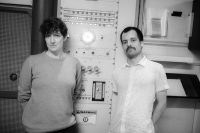
Two poets walk into an 88-Inch Cyclotron … and what happens next is an uncommon pairing of accelerated particles and artistic expression. The visiting poets – Kate Greene, a former Berkeley Lab science writer who is an author, essayist, journalist, and poet; and fellow poet, writer, and science enthusiast Anastasios Karnazes – drew inspiration from an overnight stay at the cyclotron from June 14-15 at the Department of Energy’s Lawrence Berkeley National Laboratory (Berkeley Lab).
Two poets walk into an 88-Inch Cyclotron … and what happens next is an uncommon pairing of accelerated particles and expression.
Poetry In the News
Poets Protest Guns in the Classroom
This past spring, poets and teachers Beth Ann Fennelly and Catherine Pierce organized hundreds of Mississippi educators to sign an open letter opposing guns in the classroom. “A classroom with a gun ceases to be an environment where teachers or students can feel safe engaging in the sorts of stimulating and challenging discussions that are the hallmarks of higher education,” they wrote. The petition, signed by more than three hundred educators from throughout the state, opposed HB 1083, a “campus carry bill” that would make it easier for gun owners with enhanced concealed carry permits to carry firearms in spaces like classrooms and dormitories. After weeks of debate about language and amendments, the bill eventually died. “I wouldn’t say it was due to us,” says Fennelly. “But we were able to shape public perception.”
Marilyn Kallet Named as City's New Poet Laureate
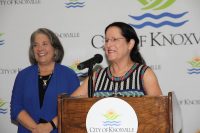
Mayor Madeline Rogero today named Marilyn Kallet as Knoxville’s new Poet Laureate. She will succeed R.B. Morris, who is the first to hold the position, when his term expires at the end of this month. Kallet is an acclaimed poet and professor in the University of Tennessee’s English Department, where for years she was the director of the Creative Writing Program. She has published 18 books including How Our Bodies Learned, The Love That Moves Me and Packing Light: New and Selected Poems, poetry from Black Widow Press.
Ilya Kaminsky Named New Director of Poetry at Tech Program
Award-winning poet Ilya Kaminsky has been appointed as the Margaret T. and Henry C. Bourne Jr. Chair in Poetry at Georgia Tech. Kaminsky will join the faculty of the School of Literature, Media, and Communication, as well as become the new director of the Poetry at Tech program, succeeding the late Thomas Lux.
Mayor Madeline Rogero today named Marilyn Kallet as Knoxville’s new Poet Laureate.
New Books
The Analyst: Poems by Molly Peacock
[Paperback] W. W. Norton & Company, 128 pp., $15.15
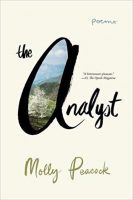
When a psychoanalyst became a painter after surviving a stroke, her longtime patient, distinguished and beloved poet Molly Peacock, took up a unique task. Weaving an invigorating tapestry of images, Peacock’s poetry bears witness to a profound role reversal as its author looks back on a forty-year relationship with her one-time analyst, now friend.
New and Selected Poems of Cecilia Vicuña edited by Rosa Alcala
[Paperback] Kelsey Street Press, 370 pp., $35.00
New and Selected Poems of Cecilia Vicuña is a telling of old cultures, modern nation states and lives in exile. Rodrigo Toscano calls Vicuña's poetry "the outer out, beyond nation states, passed 'inter state' affairs, in other words, close in, as close as we get to our fair planet's sources, and to each other." In this bilingual collection, Vicuña and her translator, Rosa Alcalá, are artist witnesses to a natural world that is a storehouse of sacred words, seeds, threads and songs. Present everywhere, they are sources for a rebalancing in human relationships and for new forms of grace and healing. In Vicuña's vision, art is life and intimacy with it is transformative.
Southern Tongues Leave Us Shining by Mark Wagenaar
[Paperback] Red Hen Press, 120 pp., $17.95

“In Southern Tongues Leave Us Shining, there is a rapturous beauty that encompasses the American South, the United States, and the world, a poetic rooted in the space around the poet and extending outward to the world with questioning, compassion, grief, and hope. The lines have an aching eloquence bustling with a truer Southern verve, one recognizable by those who know it and appreciable by those who have yet to know it. There are many lines in this collection that take me up in a swoop and carry me along the terrain of now and never.”―Afaa M. Weaver
Changing Room by Anna Woodford
[Paperback] Salt Publishing, 64 pp., $9.73
From cramped cubicles to rented bedrooms, hallways that become highways in the sleepless hours, to the space and beauty of a shrine; Woodford's award-winning poems revisit old rooms and find new ones following the birth of a child and the passing of time in the family home and beyond. There are ship rats, bedsocks, KitKats and, in the poem `Work', which was a Ledbury prize winner, the Post-it notes and endless afternoons of office life. Changing Room includes poems from Woodford's Leverhulme residency at Durham Law School, as well a sequence on ageing and getting out, which appeared on buses in the North of England and as part of a touring exhibition in libraries.
Europa by Sean O'Brien
[Paperback] Pan Macmillan, 80 pp., $13.95

Europa, Sean O’Brien’s ninth collection of poems, is a timely and necessary book. Europe is not a place we can choose to leave: it is also a shared heritage and an age-old state of being, a place where our common dreams, visions and nightmares recur and mutate. In placing our present crises in the context of an imaginative past, O’Brien show how our futures will be determined by what we choose to understand of our own European identity – as well as what we remember and forget of our shared history. Europa is a magisterial, grave and lyric work of from one of the finest poets of the age: it shows not just a Europe haunted by disaster and the threat of apocalypse, but an England where the shadows lengthen and multiply even in its most familiar and domestic corners. Europa, the poet reminds us, shapes the fate of everyone in these islands – even those of us who insist that they live elsewhere.
Europa, Sean O’Brien’s ninth collection of poems, is a timely and necessary book.
Correspondences
“Danger Blue”: Dana Goodyear Interviews Carol Muske-Dukes
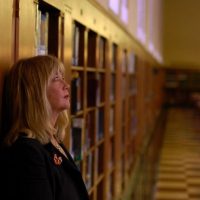
“What if one woman told the truth about her life? / The world would split open.” Muriel Rukeyser’s lines, from a poem about the still overlooked German artist Käthe Kollwitz — whose etchings of working-class women, in mourning and struggle, made her a pioneer — are a touchstone for Carol Muske-Dukes. Like so much of the feminist literary canon, from Bradstreet to Rich and beyond, she has absorbed the lines and their implied directive.
Tracy K. Smith On The Politics Of Poetry
Talking with U.S. Poet Laureate, Tracy K. Smith
by Molly McArdle
Tracy K. Smith invited her brother-in-law, who held a hulking double bass, up to the stage. At their annual Spring Benefit at the New York Botanical Garden, the Poetry Society of America honored Smith, our current U.S. Poet Laureate and winner of many prizes (including the Pulitzer). To celebrate, Smith read from her new collection of poems, Wade in the Water, with some family assistance: a two-piece jazz band.
A Lot of My “Process” Is Just Mucking About
by Peter Mishler

For this installment of an interview series with contemporary poets, Peter Mishler corresponded with Ange Mlinko. Mlinko is the author of several critically acclaimed books of poetry, including Shoulder Season, which was a finalist for the William Carlos Williams Award, and Starred Wire, a National Poetry Series pick and finalist for the James Laughlin Award. She has been the recipient of a Guggenheim Fellowship and the Randall Jarrell Award for Criticism, and served as Poetry Editor for The Nation. Her essays and reviews have been published in The Nation, The London Review of Books, Poetry, and Parnassus. Educated at St. John’s College and Brown University, she has lived abroad in Morocco and Lebanon, and is currently Associate Professor of English at the University of Florida. She lives in Gainesville.
German artist Käthe Kollwitz — whose etchings are of working-class women — are a touchstone for Carol Muske-Dukes.
Envoi: Editor’s Notes
Lessons from the Past: Pablo Neruda
I don’t have a poetic doctrine; I don’t have a poetic ideology. I am a poet by vital, biological need, and that is my doctrine. – Pablo Neruda